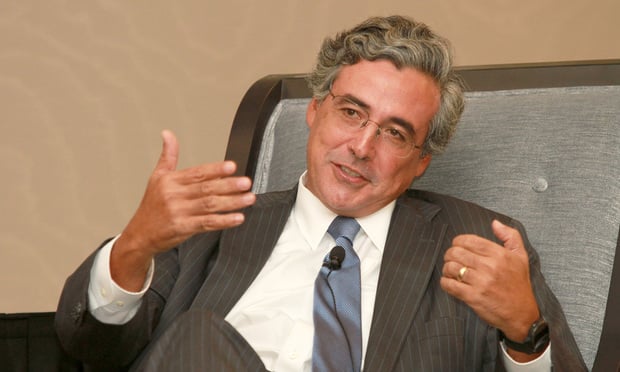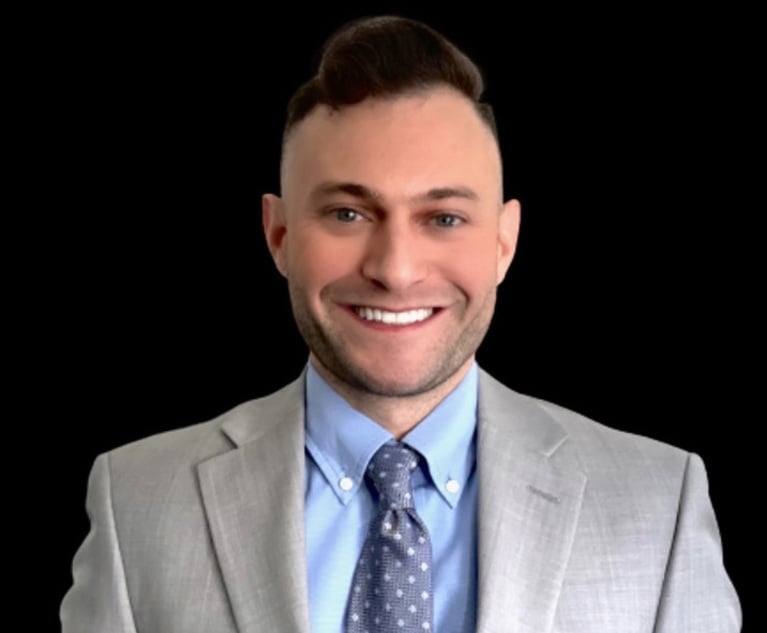SG, PTO Say It's Almost Time to Revisit Patent Eligibility
After a nearly yearlong wait, Solicitor General Noel Francisco is technically turning thumbs down on two hot-button cases involving Section 101 of the Patent Act. But he says there's another one coming next month that the court definitely should take up to address the confusion in the law.
December 09, 2019 at 08:06 AM
5 minute read
 Noel Francisco, U.S. solicitor general. (Photo: John Disney/ALM)
Noel Francisco, U.S. solicitor general. (Photo: John Disney/ALM)
The Solicitor General's Office has spoken: A rethink of the Supreme Court's Section 101 jurisprudence is "amply warranted."
Just not quite yet.
Solicitor General Noel Francisco and the U.S. Patent and Trademark Office recommended Friday that the court deny certiorari in two hot-button cases in which the Supreme Court sought recommendations last winter: Berkheimer v. HP and Hikma Pharmaceuticals USA v. Vanda Pharmaceuticals. The government says a third case, Athena Diagnostics v. Mayo Collaborative Services, which is due for a cert vote as soon as next month, is a better vehicle for clarifying patent eligibility.
"The confusion created by this Court's recent Section 101 precedents warrants review in an appropriate case," the solicitor general states. But Berkheimer involves "ancillary issues" and the U.S. Court of Appeals for the Federal Circuit got the Hikma result right. "The Court should await a case in which lower courts' confusion about the proper application of Section 101 and this Court's precedents makes a practical difference."
Eligibility is the most controversial area in patent law. The high court redrew the patent landscape earlier this decade with four decisions that found laws of nature, natural phenomena and abstract ideas ineligible for patent protection. Those exceptions aren't listed in Section 101, which covers "any new and useful process, machine, manufacture, or composition of matter." But the court said they're implicit in the Constitutional command of promoting the progress of science and useful arts.
The Supreme Court decisions have given accused infringers a relatively simple and painless avenue for invalidating patents that are vaguely written or attempt to monopolize entire fields of endeavor. Critics charge that it's created an "I know it when I see it" standard that has no grounding in the law.
The Federal Circuit has been clamoring for the Supreme Court or Congress to clarify eligibility, and Senate Judiciary's IP subcommittee has held a series of hearings and proposed a framework but as of yet not introduced any legislation.
The solicitor general's briefs say the Supreme Court's decisions have "given rise to an array of difficult questions," such as what the court meant in using phrases such as "a search for an inventive concept" and "well-understood, routine, conventional activity" previously known in the industry. "The confusion created by this Court's recent Section 101 precedents warrants review in an appropriate case," the briefs state.
But it's recommending against cert in Berkheimer, a software case in which the Federal Circuit ruled that eligibility sometime poses questions of fact that can't be resolved at the pleading stage. "The Court should grant review in an appropriate case to clarify the substantive Section 101 standards and then address any ancillary issues that remain," the solicitor general states.
And it's urging the court to leave alone Hikma, which conferred eligibility on a method of treating disease by calibrating drug dosage to a patient's genotype. The solicitor general agrees that the Federal Circuit reached the right result there, even though it might be difficult to reconcile with the framework the Supreme Court set out in 2012′s Mayo Collaborative Services v. Prometheus Laboratories.
When the Mayo framework is applied "mechanically," the solicitor general said, "it is arguably unclear whether even a method of treating disease with a newly created drug would be deemed patent-eligible."
If the court must grant cert in Berkheimer or Mayo, the solicitor general is recommending that it hold the cases, grant cert in the diagnostics case Athena and decide it first. At the Federal Circuit, all 12 active judges signed eight separate opinions in Athena urging the Supreme Court or Congress to at least refine, if not overrule, the patent eligibility case law.
"Those various opinions provide substantial grounds for inferring that, if the Federal Circuit were not bound by the current Section 101 framework, that court might have reached different outcomes in Athena itself and in other diagnostic-method cases," the briefs state. "Whether in Athena or another such case, further guidance from this court is amply warranted."
The briefs are signed by Francisco and other solicitor general leadership; DOJ IP veterans Mark Freeman, Scott McIntosh and Melissa Patterson; and PTO general counsel Sarah Harris, Solicitor Thomas Krause and Associate Solicitors Amy Nelson and Robert McManus.
Weil Gosthal & Manges partner Edward Reines said there may not be much appetite at the court to loosen Section 101 jurisprudence. Over the last five years the court has sought the SG's views on Federal Circuit decisions that expanded patent eligibility, but not on those that restricted it, he noted.
"This court has expressed more interest to strengthen Mayo/Alice rather than loosen that line of cases." Reines said. "The forces seeking a reconsideration of Mayo need to be careful what they wish for in seeking high court review. They may get it."
This content has been archived. It is available through our partners, LexisNexis® and Bloomberg Law.
To view this content, please continue to their sites.
Not a Lexis Subscriber?
Subscribe Now
Not a Bloomberg Law Subscriber?
Subscribe Now
NOT FOR REPRINT
© 2025 ALM Global, LLC, All Rights Reserved. Request academic re-use from www.copyright.com. All other uses, submit a request to [email protected]. For more information visit Asset & Logo Licensing.
You Might Like
View All
'Religious Discrimination'?: 4th Circuit Revives Challenge to Employer Vaccine Mandate
2 minute read
'Pull Back the Curtain': Ex-NFL Players Seek Discovery in Lawsuit Over League's Disability Plan


Fatal Shooting of CEO Sets Off Scramble to Reassess Executive Security
5 minute readLaw Firms Mentioned
Trending Stories
- 1SDNY Criminal Division Deputy Chief Returns to Debevoise
- 2Brownstein Adds Former Interior Secretary, Offering 'Strategic Counsel' During New Trump Term
- 3Tragedy on I-95: Florida Lawsuit Against Horizon Freight System Could Set New Precedent in Crash Cases
- 4Weil, Loading Up on More Regulatory Talent, Adds SEC Asset Management Co-Chief
- 5Big Banks Did Great Last Year. What Does That Mean for Big Law?
Who Got The Work
J. Brugh Lower of Gibbons has entered an appearance for industrial equipment supplier Devco Corporation in a pending trademark infringement lawsuit. The suit, accusing the defendant of selling knock-off Graco products, was filed Dec. 18 in New Jersey District Court by Rivkin Radler on behalf of Graco Inc. and Graco Minnesota. The case, assigned to U.S. District Judge Zahid N. Quraishi, is 3:24-cv-11294, Graco Inc. et al v. Devco Corporation.
Who Got The Work
Rebecca Maller-Stein and Kent A. Yalowitz of Arnold & Porter Kaye Scholer have entered their appearances for Hanaco Venture Capital and its executives, Lior Prosor and David Frankel, in a pending securities lawsuit. The action, filed on Dec. 24 in New York Southern District Court by Zell, Aron & Co. on behalf of Goldeneye Advisors, accuses the defendants of negligently and fraudulently managing the plaintiff's $1 million investment. The case, assigned to U.S. District Judge Vernon S. Broderick, is 1:24-cv-09918, Goldeneye Advisors, LLC v. Hanaco Venture Capital, Ltd. et al.
Who Got The Work
Attorneys from A&O Shearman has stepped in as defense counsel for Toronto-Dominion Bank and other defendants in a pending securities class action. The suit, filed Dec. 11 in New York Southern District Court by Bleichmar Fonti & Auld, accuses the defendants of concealing the bank's 'pervasive' deficiencies in regards to its compliance with the Bank Secrecy Act and the quality of its anti-money laundering controls. The case, assigned to U.S. District Judge Arun Subramanian, is 1:24-cv-09445, Gonzalez v. The Toronto-Dominion Bank et al.
Who Got The Work
Crown Castle International, a Pennsylvania company providing shared communications infrastructure, has turned to Luke D. Wolf of Gordon Rees Scully Mansukhani to fend off a pending breach-of-contract lawsuit. The court action, filed Nov. 25 in Michigan Eastern District Court by Hooper Hathaway PC on behalf of The Town Residences LLC, accuses Crown Castle of failing to transfer approximately $30,000 in utility payments from T-Mobile in breach of a roof-top lease and assignment agreement. The case, assigned to U.S. District Judge Susan K. Declercq, is 2:24-cv-13131, The Town Residences LLC v. T-Mobile US, Inc. et al.
Who Got The Work
Wilfred P. Coronato and Daniel M. Schwartz of McCarter & English have stepped in as defense counsel to Electrolux Home Products Inc. in a pending product liability lawsuit. The court action, filed Nov. 26 in New York Eastern District Court by Poulos Lopiccolo PC and Nagel Rice LLP on behalf of David Stern, alleges that the defendant's refrigerators’ drawers and shelving repeatedly break and fall apart within months after purchase. The case, assigned to U.S. District Judge Joan M. Azrack, is 2:24-cv-08204, Stern v. Electrolux Home Products, Inc.
Featured Firms
Law Offices of Gary Martin Hays & Associates, P.C.
(470) 294-1674
Law Offices of Mark E. Salomone
(857) 444-6468
Smith & Hassler
(713) 739-1250










